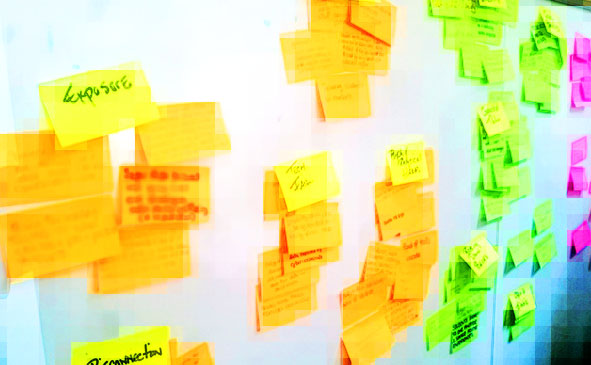On May the 5th around 49 people from 19 institutions gathered at LSE for the second Future Happens event – “Connect:Disconnect” focusing on Social Media in teaching and learning. The event was co-run by LSE and UAL, hosted by myself, Peter Bryant and Donna Lanclos. Over the afternoon we facilitated a series of ‘hacks’ in which we challenged groups to develop positive ‘principles’ in response to key areas. For example, how can Social Media practices help to:
- Develop and share identity
- Build and support community
- Engage in debate and dialogue
- Generate and share creativity
…in teaching and learning. This was preceded by an ‘intervention’ (via Skype) from Bon Stewart to get our minds up and running.

(The background to the event is here http://www.futurehappens.org/future-happens-2/
The responses to the hacks were captured in a series of Google docs which can be found here: http://www.futurehappens.org/fh2/
Example principles generated on the day include:
- Valuing difference in yourself and others, being civil and inclusive.
- Enabling informed choice and empowering through awareness of options
- Building communications channels and removing barriers to realise a connected community outside the physical space
- Crowdsourcing/co-creation via social media enhances a sense of belonging and gives access to a greater diversity of perspectives, facilitating critical reflection
- Encourage debate to span multiple spaces, including out of sight of the institution
- Participation comes with an understanding that their are collective rights and responsibilities
We plan to gently curate the principles and make them available to help frame the collation/development of examples of teaching practice (or to inform the development of positive Social Media guidelines). The point being that the principles are not in-of-themselves rules or guidelines but principles-to-inform-practice. The hacks framed discussions that, within our institutions, we often can’t find the time for or which get bogged down by parochialism.
Before we hit the hack section of the afternoon we ran an activity called ‘BURNT’. I believe we were referring to the notion of getting-your-fingers-burnt but we can’t exactly remember where the name came from. The idea was to bring all of the hopes, fears and paranoia surrounding Social Media to the surface to clear the air before we attempted to develop the principles.
Everyone wrote three post-its on this basis:
- ORANGE: Imagined worst case scenario
- GREEN: Super positive personal aspiration
- PINK: True life horror story
(all in the context of teaching and learning)
Donna and Peter then clustered the results while the hacks took place. Clusters included:
Imagined worst case scenario
- Disconnection
- Psychological/Physical harm
- Tech fail
- Abuse of power
- Reputation
- Job security
- Exposure
Super positive personal aspiration
- Breaking down Barriers
- Open and Flexible
- Political activism/Citizenship
- Connected Teaching & Learning
- Career benefits
True life horror story
- Bad things happen to me
- Bad things happen to them
- #fail
- Falsification
With a few lone Post-its such as ‘@piersmorgan’ in True life horror story…
The BURNT activity did appear to clear the air and, we hope, helped groups to generate positive principles over the afternoon. We think there is something valuable to build on here in conjunction with the principles as a fairly mixed room produced BURNT items which clustered reasonably neatly (the true life horror stories we the trickiest to cluster). Alongside curating the principles we hope to get permission from participants to post the BURNT items online.
In parallel to this we also encouraged participants to note down learning designs or activities which had worked well using Social Media. For me, uncovering workable nuggets of teaching and learning is key to propagating positive practice.
Having initially run through the various outputs from the event it is clear to me than many of the risks associated with the use of Social Media in teaching contexts are the most powerful opportunities. For example, risks around personal and professional reputation are an opportunity to discuss ‘collective rights and responsibilities’. Similarly, unease around identity and credibility is an opportunity to approach, as one group put it, ‘understanding authenticity in different contexts’. Another example is the potential to explore issues of verification and epistemology in the context of fake news or disinformation.
If we take a positive teaching approach to Social Media then the very aspects of it that are held up as problematic become opportunities to explore pertinent themes such as, identity, authenticity, citizenship and diversity. For me, this is about framing or scaffolding our students forms of engagement with Social Media to foster awareness, reflection and critical thinking. All of which underpin positive identity formation and becoming.
An important ingredient in this is establishing trust between teaching staff and their own institution. Things can go wrong no matter how well they have been designed and framed. This is when the institution needs to stand by teaching staff who have taken the time highlight the risks to students and emphasised the personal responsibility each student has in public/visible environments (through teaching and not only by issuing a list of rules).
The next step for us after the hack is to post a lightly curated version of the work from the afternoon which can feed into post-hack events run by participants in their own institutions. I hope to run a post-hack at UAL in which we collate examples of teaching that build on, or respond to, each principle. Circulating well contextualised ‘learning designs’ that take advantage of Social Media as a teaching and learning space feels like a pragmatic way to build on the hard work and critical thinking of the event. Thanks to all who took part.
